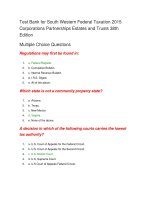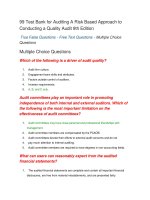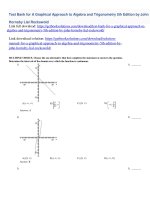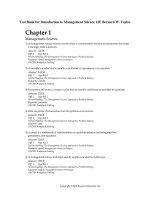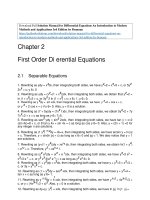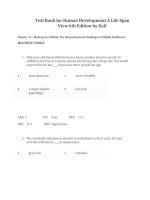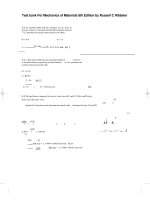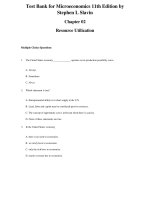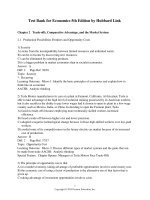Download test bank for diversity consciousness opening our minds to people cultures and opportunities 3rd edition by bucher
Bạn đang xem bản rút gọn của tài liệu. Xem và tải ngay bản đầy đủ của tài liệu tại đây (222.05 KB, 7 trang )
Test Bank for Diversity Consciousness Opening our Minds to
People Cultures and Opportunities 3rd Edition by Richard
D.Bucher and Patricia L.Bucher
TEST BANK
CHAPTER ONE - DIVERSITY: AN OVERVIEW
CH 1 - Multiple Choice
1. According to the text, diversity refers to
a. only race and gender
b. individual but not cultural differences
c. cultural but not individual differences
d. all of the ways in which people are different
2. Culture refers to
a. language
b. beliefs
c. rules
d. all of the above
3. An estimated ____ languages are spoken throughout the world.
a.
b.
c.
d.
200
1,000
7,000
70,000
4. Maria is a member of the “baby-boom generation.” Unlike the children of today, she was not
born into the digital world but learned the language as well as the new technology later in
life. Thus, we can refer to Maria as a
a. digital native
b. digital immigrant
c. digital millennial
d. digital introvert
5. According to U.S. Census data cited in the text, which of the following are included among
the ten names in the U.S.?
a. Rodriguez
b. Smith
c. Williams
d. All of the above
e. Only b and c
6. U. S. Census data indicate that
a. the country’s earliest inhabitants were monocultural
b. the percentage of Whites will gradually increase by the year 2050
c. the cultural landscape has changed very little since 1790
d. most of the population now lives in urban areas
e.
all of the above
7. Racial and ethnic minorities now make up approximately ___ of the U.S. population.
a. one-tenth
b. one-fifth
c. one-third
d. one-half
e. two-thirds
8. Approximately ___ of respondents identified themselves as members of more than one race
in the 2000 U. S. Census.
a. 3 percent
b. 20 percent
c. 33 percent
d. 50 percent
9. U. S. demographic data indicate that
a. the international student population is declining rapidly
b. women will make up almost 50 percent of the labor force by the year 2050
c. the percentage of workers with disabilities will continue to decrease
d. all of the above
10. _______ is the author of The World is Flat.
a. McLuhan
b. Rodriguez
c. Takaki
d. Friedman
e. Covey
11. According to Marshall McLuhan, technological advances have transformed our social
world into a
a. global village
b. virtual culture
c. digital divide
d. foreign country
12. As a global business, IBM finds that it must adapt to local cultures and practices. This
blending of global and local ideas and practices is referred to as
a. cultural fine tuning
b. cultural cruise control
c. glocalization
d. cultural lag
e. socioglobal transformation
13. Chapter One addresses a number of different reactions to our changing cultural landscape.
Which of the following reactions is most likely to lead to cultural misunderstandings and
conflict?
a. cultural cruise control
b. beginning adjustments
c. fine tuning
d. cultural mindfulness
14. The term “melting pot” is most closely associated with
a. nativism
b.
c.
d.
e.
assimilation
segregation
transculturation
pluralism
15. The image of a quilt made up of many different colors reflects which of the following
views of diversity:
a. nativism
b. assimilation
c. pluralism
d. transculturation
e. the melting pot
16. Dimensions of diversity
a. are found within groups
b. are found within individuals
c. may be hidden or visible
d. all of the above
17. Dimensions of diversity include
a. race
b. social class
c. learning style
d. all of the above
e. only a and b
18. Diversity consciousness refers to
a. awareness
b. understanding
c. skills
d. all of the above
e. only a and b
19. Which of the following illustrates diversity consciousness?
a. Becoming aware of possible gender differences in the way people communicate
b. Being ready and able to adapt when communicating with men and women
c. Understanding why men and women sometimes misunderstand each other d. All of the
above
e. Only a and c
20. Diversity consciousness
is a. common sense
b.
c.
d.
e.
simply ignoring differences
the result of good intentions
important for all of us
all of the above
CH 1 - True-False
1.
2.
3.
4.
According to the text, diversity refers to all of the ways in which people are different.
According to the text, diversity is a new phenomenon.
At the present, a majority of the U.S. population lives in rural areas.
Census 2000 data show that Asians and Pacific Islanders as well as Hispanics are the two
fastest-growing minority populations in the U.S.
5. In the most recent Census, respondents could identify themselves as belonging to more
than one racial category.
6. The glass ceiling refers to attitudes, policies, and procedures that have created more
upperlevel management opportunities for minorities and women.
7. Demographic data indicate that women, minorities, and people with disabilities will continue
to account for the vast majority of new entries in the U.S. workforce.
8. Employment projections show that workers with disabilities will make up a much
smaller percentage of the U.S. labor force in the years ahead.
9. According to Friedman, people and cultures are becoming more and more independent in
the twenty-first century.
10. When cultural lag occurs, one part of a culture is not keeping pace with another part.
11. Shifting into “cultural cruise control” allows us to interact effectively in diverse settings.
12. Pluralism refers to the process by which people lose their cultural differences and blend
into the wider society.
13. Assimilation refers to the process through which cultural differences are acknowledged
and preserved.
14. Diversity consciousness means ignoring differences and treating everybody the same.
15. Race and gender are examples of master statuses.
16. According to the text, diversity is a new phenomenon.
17. One form of diversity education is study circles.
CH 1 – Fill In
1. _____ _____ refer to people who are “native speakers” of the language of computers,
video games, and the Internet, while the term _____ _____ refers to those people who were
not born into the digital world but learned about the new technology later in life.
2. In Chapter One, the author emphasizes the importance of developing a _____
perspective, meaning a view of the world and our place in it.
3. Generally, high school dropouts and college graduates vary in their ability to access and
use information and communication technologies. This gap is known as the _____ _____ .
4. Malcolm assumes that his values, norms, and beliefs are universal. When he interacts with
others, he is oblivious to any number of cultural differences. Malcolm’s inability to react
and adjust effectively to different cultural situations is described in Chapter One as _____
_____ _____.
CH 1 - Essay
1. Explain what is meant by our changing cultural landscape.
2. Describe and give examples of demographic, social, and cultural changes that are
responsible for the growing importance of diversity.
3. Explain three benefits of developing a global perspective.
4. Each of us reacts to our changing cultural landscape in a variety of ways. Specifically, we
might shift into cultural cruise control, or perhaps make beginning adjustments or fine
tuning. Discuss one specific personal encounter. How would you identify your reaction
(cultural cruise control, beginning adjustments, or fine tuning) and why? Be as specific as
possible.
5. Contrast assimilation and pluralism and give an example of each.
6. Assimilation may have both negative and positive consequences for immigrants to the
U.S. Explain.
7. According to the text, dimensions of diversity interrelate. Explain why, using examples to
support your answer.
8. Discuss one example that illustrates each of the following statements:
a. Dimensions of diversity may be hidden or visible.
b. Dimensions of diversity are found within groups as well as within individuals.
c. Dimensions of diversity are in a constant state of flux.
d. Dimensions of diversity are not always clear-cut or easily defined.
9. Explain the difference between diversity education and diversity training.
10. The author discusses a number of diversity myths. List and explain three of these myths.
Answer Key – Chapter
One
Multiple Choice:
1.d
2.d
3.c
4.b
5.d
6.d
7.c
8.a
9.b
10.d
11.a
12.c
13.a
14.b
15.c
16.d
17.d
18.d
19.d
20.d
True/False:
1.T
2.F
3.F
4.T
5.T
6.F
7.T
8.F
9.F
10.T
11.F
12.F
13.F
14.F
15.T
16.F
17.T
Fill In
1. digital natives, digital immigrants
2. global
3. digital divide
4. cultural cruise control
